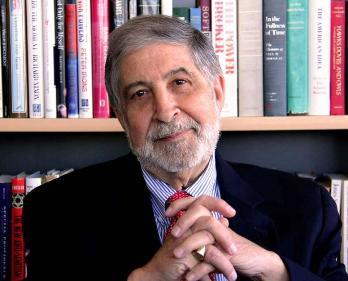“Heresy: any belief or theory that is strongly at variance with established beliefs, customs, etc.”
“[James] Madison understood that in the end, democracy is not about policy but about process – it’s about how we select our leaders, how we deliberate, how we decide – and it is the process itself that has broken down.”

I’m going to tell you about a book that should be required reading by every citizen who wants a return of real democracy in Congress.
First, a little backstory.
Mickey Edwards is a former Republican congressman who served the 5th district of Oklahoma from 1977 to 1993. What he learned in those 16 years is something that has gained sharper focus in the last six years – namely that the current political system is gravely dysfunctional.
While this may not come as a great shock to most of us, during the time Edwards spent in Congress, he gradually became aware of what most of us do not see behind the curtain: that both parties not only control who gets selected to run for office, but once elected to Congress, the party controls how they will vote on all big issues as well as some of the smaller issues as well. To challenge the system – to thoughtfully consider, judge and vote on a piece of legislation on your own – Mickey made clear to me, is political death.
In his new book, The Parties vs. The People – How to Turn Republicans and Democrats into Americans, Edwards describes, through his own firsthand experience, how critical legislative battles are more about party advantage than principle.
“The two parties are like two tribes constantly at war with one another,” Edwards told me at a dinner before a local talk. “Their respective purposes are to avoid compromise, reward intransigence and undermine democracy.”
As Edwards describes in his book, they are like a well-dressed version of the Sharks and the Jets. Each side lives in the United States, but has little in common other than their disdain for each other. The gangs fight with switchblades; the parties fight with majority power and influence. Lost in all this is the neighborhood, the people.
During our dinner together, Mickey explained it to me this way. “Say, you’ve just been elected to Congress, Jim. Your first day in Washington and you’re feeling great. You really want to contribute to the folks back home, but you also recognize a higher sense of crafting legislation that benefits all.
“You party’s representative tells you: ‘Jim, you have a great background in finance (I don’t, but go ahead, I tell Mickey). You’re so good at finance that we want to put you on the finance committee and we’re going to give you all the support you need. However, before we can finalize your position, you must first sign a written pledge to vote according to the leadership’s recommendations.’
“Wait a second,” I tell Mickey, “this sounds like the same scheme that tax activist Grover Norquist demands from candidates before their elected.
“Exactly,” he says. “This happens, after you’ve been elected.”
I look at Mickey waiting for the punchline, and… there is none! This is the way the system has worked – stuck in perpetual tribal mentality.
Further exacerbating the problem is money… a lot of money.
The recent Supreme Court decision (Citizens United v. Federal Election Commission) now permits labor organizations and corporations to make political contributions as if they were individuals. While the lowly individual – you and I – can only contribute $2,500 per election cycle, labor unions and corporations can contribute hundreds of thousands to increase a party’s influence. PACs and Super-PACs can receiveunlimited donations to campaigns for or against anyone without knowing who the donors are!
Back on “The Hill” where legislation is supposed to be thoughtfully considered, the majority party controls committee assignments as well as the agenda which determines which bills will come up for debate and vote.
“In theory,” Edwards writes, “the committees exist to deliberate about the best solutions to major national problems; in realty, they exist to advance the partisan agenda of a temporary majority – or, for members of the minority, to block that agenda – and it is thus seen as the responsibility of the party’s representatives on that committee to champion the party line. … In Congress,” Edwards declares, “party is everything! …
“The partisan poison that has seeped into American politics – and American governance – is not only eroding belief in the democratic process, it is proving to be a danger to the very idea of participatory self-government. Democracy,” Edwards stresses, “requires active citizen participation – but partisanship, which is not a conflict over principle but a combat between private organizations, each seeking political advantage, is creating a system which stirs not confidence but rage.”
Mickey Edwards’ aim “is to open up the process to give American voters more choice and more voice, and to eliminate the partisan forces that limit options and dilute representation. I wish to restore,” he stresses, “democracy to our democracy.”
Comments










